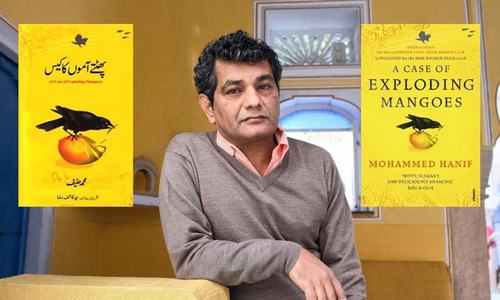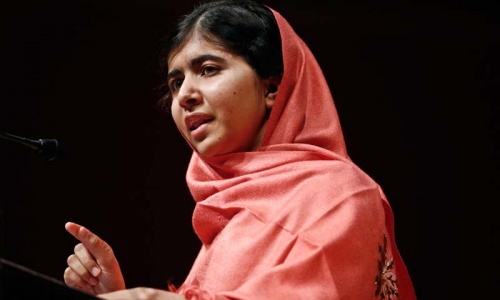BANNING and burning books is a manifestation of a culture that is afraid to face the truth. It is ignorance of the book’s message or the fear of the latter that is often the reason for someone trying to ban a book. We have a long history of suppressing dissenting views perceived as posing a threat to the prevailing order. Not only have books been banned, writers too have been persecuted. The space for reason and freedom of expression is further shrinking thanks to growing authoritarianism and rising bigotry in society.
The reported confiscation of copies of the Urdu translation of Mohammed Hanif’s book A Case of Exploding Mangoes and the recommendation by a Punjab Assembly panel to ban three seminal books on Islam are the latest examples of the growing intolerance towards critical thinking. The books include Lesley Hazleton’s The First Muslim and After the Prophet.
Where Exploding Mangoes is concerned, some personnel allegedly belonging to an intelligence agency were said to have raided the office of the publisher in Karachi and taken away copies of the translated book that came out last year. Interestingly, the original English edition of the book — a satirical take on Gen Ziaul Haq’s plane crash — was published in 2008, and the work has been internationally acclaimed.
It seems that certain elements have suddenly discovered something in the Urdu version that they feel threatens our ‘national security’. It says a lot about their lack of understanding of a literary work. The raid itself could, perhaps, be a plot for a new bestseller satire by the author. Apparently, the government has not banned the book, so who ordered the raid on the publisher?
Confident societies face criticism rather than silence the messenger.
More insidious is the suggestion to ban the books authored by Lesley Hazleton, an American journalist and scholar. Both books have been impeccably researched. “The First Muslim illuminates not only an immensely significant figure but his lastingly relevant legacy.”
I have read the two books by Hazleton and found them to be extremely instructive, more than any other work on the subject. The books have been a bestseller in this country for more than a decade, and suddenly some unscrupulous lawmakers want these books to be banned just because of their own narrow-mindedness and prejudices.
Rising bigotry has been the main reason for the decline of sound scholarship regarding religious matters in this country. Some genuine scholars like Javed Ghamdi have had to leave the country because of the threat to their lives. Many enlightened clerics have been killed by extremists, with the result that the interpretation of religion is left to semi-educated mullahs. It will be a tragedy if these books are banned in this country. One hopes that the government has the sense to ignore such mindless recommendations.
How paranoid certain sections of our establishment have become with any critical narration of this country’s history is apparent in their reaction to a recently published book, The Battle for Pakistan: The Bitter US Friendship and a Tough Neighbourhood. It is a remarkable work by Shuja Nawaz, an acclaimed writer on Pakistan’s military. Although the book is not banned, its launch in Pakistan was blocked allegedly by certain quarters said to be unhappy with the objective study of the rocky relationship between the Pakistani military and the US in the past decade.
But the reality is that this is a well-researched book and the arguments are substantiated by facts and based on interviews with senior Pakistani and US military officials directly involved in policymaking during that period. Nawaz previously wrote an authoritative history of the Pakistani military: Crossed Swords: Pakistan, its Army and the Wars Within.
Despite the attempt to block the launch, the book has already drawn a large number of readers. Instead of learning from their mistakes and accepting the reality, the powers that be are attempting to restrict the freedom of views. It is such a narrow-minded approach that turns a country into an intellectual desert.
Lies and deception have often been used to cover up blunders, conspiracies, and military misadventures spanning Pakistan’s seven-decade history. Over the years, great pains have been taken to hide facts from the nation, even if these are generally known. Failure is celebrated as victory. This situation has led to a widening trust deficit between the public and the authorities.
Unsurprisingly, the people tend to believe foreign publications on the issue, however unrealistic they may be. So sensitive have the concerned authorities become that even a public debate on such issues is seen as breaching national security. As a result, we can never learn from our mistakes and wrongdoings. It’s all in the name of ‘national security’ — a handy term when it comes to suppressing saner voices. Such strong-arm actions are actually a sign of weakness. Confident societies face criticism rather than silence the messenger.
People want to live in a society where they enjoy freedom of thought and action and can freely exercise their right to speak. Liberal democracies thrive on the freedom of expression. Unfortunately, the past few years have seen an attempt to roll back democratic values.
Freedom of expression is the principal target of authoritarianism. In fact, one of its symptoms is the creeping expansion of ‘deep state’ power. The raid on the office of a publication house in Karachi and the attempt to stop the launch of an important book on Pakistan-US relations is a grim reminder of a country adrift.
Equally alarming is the rise of bigotry in society and the growing confluence of religious extremism and politics. The call by some lawmakers for banning seminal works on Islam is troubling. The strengthening of right-wing religious extremism threatens not only to weaken democratic institutions but also to divide the country.
Repression, achieved either through direct censorship or other forms of pressure, will turn the country away from the path of progress and enlightenment. The weakening of democratic institutions gives non-government forces greater opportunity to get involved in manipulating politics as they attempt to thwart fundamental rights. More worrisome is that all this is happening under a democratically elected government.
The writer is an author and journalist.
Twitter: @hidhussain
Published in Dawn, January 15th, 2020














































